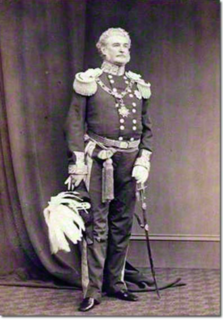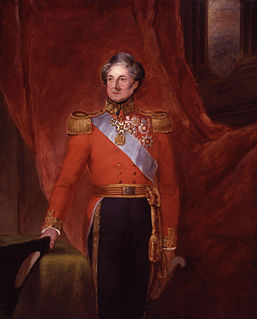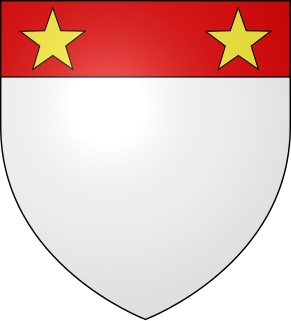Related Research Articles

Albrecht Theodor Emil Graf von Roon was a Prussian soldier and statesman. As Minister of War from 1859 to 1873, Roon, along with Otto von Bismarck and Helmuth von Moltke, was a dominating figure in Prussia's government during the key decade of the 1860s, when a series of successful wars against Denmark, Austria and France led to German unification under Prussia's leadership. A moderate conservative and supporter of executive monarchy, he was an avid modernizer who worked to improve the efficiency of the army.

Henry Hardinge, 1st Viscount Hardinge, was a British Army officer and politician. After serving in the Peninsula War and the Waterloo Campaign he became Secretary at War in Wellington's ministry. After a tour as Chief Secretary for Ireland in 1830 he became Secretary at War again in Sir Robert Peel's cabinet. He went on to be Governor-General of India at the time of the First Anglo-Sikh War and then Commander-in-Chief of the Forces during the Crimean War.

Field Marshal Hugh Gough, 1st Viscount Gough, was a British Army officer. After serving as a junior officer at the seizure of the Cape of Good Hope during the French Revolutionary Wars, Gough commanded the 2nd Battalion of the 87th Regiment of Foot during the Peninsular War. After serving as commander-in-chief of the British forces in China during the First Opium War, he became Commander-in-Chief, India and led the British forces in action against the Marathas defeating them decisively at the conclusion of the Gwalior Campaign and then commanded the troops that defeated the Sikhs during both the First Anglo-Sikh War and the Second Anglo-Sikh War.

Lucius Bentinck Cary, 10th Viscount Falkland GCH, PC, styled Master of Falkland until 1809, was a British colonial administrator and Liberal politician.

Field Marshal John Colborne, 1st Baron Seaton, was a British Army officer and colonial governor. After taking part as a junior officer in the Anglo-Russian invasion of Holland, Sir Ralph Abercromby's expedition to Egypt and then the War of the Third Coalition, he served as military secretary to Sir John Moore at the Battle of Corunna. He then commanded the 2nd Battalion of the 66th Regiment of Foot and, later, the 52nd Regiment of Foot at many of the battles of the Peninsular War. At the Battle of Waterloo, Colborne on his own initiative brought the 52nd Regiment of Foot forward, took up a flanking position in relation to the French Imperial Guard and then, after firing repeated volleys into their flank, charged at the Guard so driving them back in disorder.

Friedrich Heinrich Ernst Graf von Wrangel was a Generalfeldmarschall of the Prussian Army.

General Sir Colin Halkett was a British Army officer who became Lieutenant Governor of Jersey.

Field Marshal Hugh Henry Rose, 1st Baron Strathnairn, was a senior British Army officer. He served as a military adviser to the Ottoman Army who were seeking to secure the expulsion of the forces of Mehemet Ali from Syria during the Egyptian–Ottoman War. He then fought with the French Army at the Battle of Alma, the Battle of Inkerman and at the Battle of Mamelon during the Crimean War. During the Indian Rebellion of 1857 Rose was given command of the Central Indian Field Force and defeated the armies at Jhansi in April 1858, at Lahore in May 1858 and at Gwalior in June 1858. He went on to be Commander of the Bombay Army, Commander-in-Chief, India and then Commander-in-Chief, Ireland.

Field Marshal Stapleton Cotton, 1st Viscount Combermere, was a British Army officer, diplomat and politician. As a junior officer he took part in the Flanders Campaign, in the Fourth Anglo-Mysore War and in the suppression of Robert Emmet's insurrection in 1803. He commanded a cavalry brigade in Sir Arthur Wellesley's Army before being given overall command of the cavalry in the latter stages of the Peninsular War. He went on to be Commander-in-Chief, Ireland and then Commander-in-Chief, India. In the latter role he stormed Bharatpur—a fort which previously had been deemed impregnable.

Field Marshal William Harcourt, 3rd Earl Harcourt, was a British nobleman and British Army officer. He served as an aide-de-camp to Lord Albemarle for the expedition to Havana during the Seven Years' War. He also commanded his regiment at the Battle of White Plains and then captured General Charles Lee at Basking Ridge during the American Revolutionary War. After that he commanded the British Cavalry at the Battle of Willems during the Flanders Campaign. He succeeded the Duke of York as commander during that campaign and oversaw the British retreat and their final evacuation from Bremen. His last main military role was as Governor of the Royal Military College at Great Marlow.
The 91st Regiment of Foot was a Line Regiment of the British Army, raised in 1794. Under the Childers Reforms it amalgamated with the 93rd Regiment of Foot to form the Argyll and Sutherland Highlanders in 1881.
Field Marshal Sir John Forster FitzGerald, GCB, was a soldier from Ireland who served as an officer in the British Army. He fought in the Peninsular War, seeing action at the Battle of Badajoz, the Battle of Salamanca and the Battle of Vitoria and commanding a brigade during the Battle of the Pyrenees before being captured by the French Army. He became Commandant of Quebec and then went on to be Commandant of Montreal, Quebec. He was given command of the 20th Regiment of Foot in Bombay before being given a divisional command in the Madras Army but shortly afterwards transferring to Bombay where he was given a divisional command of the Bombay Army. He later became a Liberal Member of Parliament.
The 66th (Berkshire) Regiment of Foot was an infantry regiment of the British Army, raised in 1756. Under the Childers Reforms it amalgamated with the 49th (Hertfordshire) Regiment of Foot to form the Princess Charlotte of Wales's in 1881.
The 41st (Welch) Regiment of Foot was an infantry regiment of the British Army, raised in 1719. Under the Childers Reforms it amalgamated with the 69th Regiment of Foot to form the Welch Regiment in 1881.

Field Marshal Sir Frederick Paul Haines was a British Army officer. He fought in the First Anglo-Sikh War, in the Second Anglo-Sikh War and then in the Crimean War: during the latter conflict at the Battle of Inkerman, he held an important barrier on the post road guarding the approach to the 2nd Division camp for six hours. He served in India during the Indian Rebellion before becoming Commanding Officer of the 8th Regiment of Foot in the United Kingdom and then Commander of a Brigade in Ireland. He went on to be General Officer Commanding the Mysore Division of the Madras Army and then Quartermaster-General to the Forces in the United Kingdom. He returned to India to become Commander-in-Chief of the Madras Army in May 1871 and then Commander-in-Chief, India in April 1876: he commanded the forces in India during the Second Anglo-Afghan War and successfully argued for a large force being made available before mobilisation occurred, but once the war started the Governor-General of India, Lord Lytton, was inclined to by-pass Haines and deal direct with commanders in the field, causing friction between the two men.

Hon. Sir Galbraith Lowry Cole, was an Anglo-Irish British Army general and politician.

Colonel Standish Darby O'Grady, 2nd Viscount Guillamore from Cahir Guillamore, County Limerick, was an Anglo-Irish politician and British Army officer.

General Sir Richard England, was a British Army officer, born at Detroit, which was then part of Upper Canada. During the Napoleonic Wars he saw active service in Walcheren, Sicily, and at Waterloo, before commanding regiments and divisions in the Crimean War and in India.

The Hon. Frederick St John was an officer of the British Army and a politician. He rose to the rank of general during his career and saw service during the French Revolutionary and Napoleonic Wars, and the Second Anglo-Maratha War. He also sat briefly for the constituency of Oxford.

General Sir Robert John Hussey Vivian was a British officer in the Madras infantry from the Vivian family.
References
- ↑ "Lockhart Little's service history". Archived from the original on 2009-04-18. Retrieved 2009-05-14.